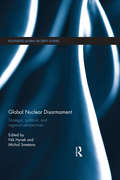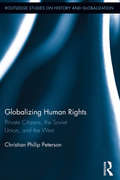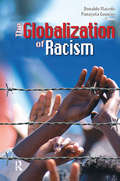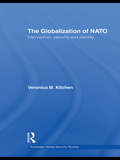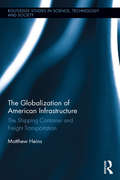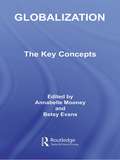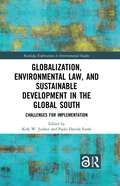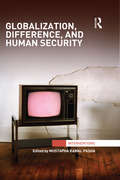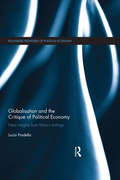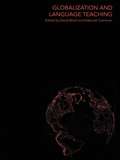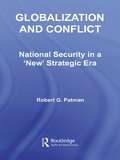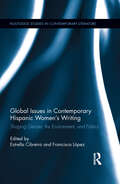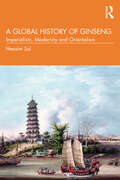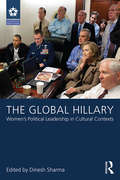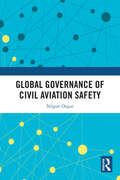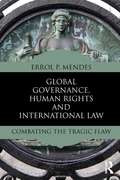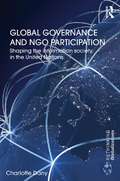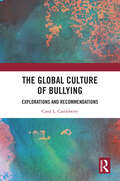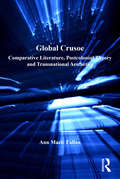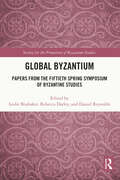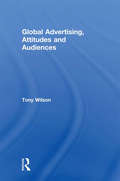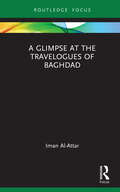Special Collections
Benetech’s Global Certified Accessible Titles
Description: Benetech’s GCA program is the first independent third-party EPUB certification to verify ebook accessibility. By creating content that is born accessible, publishers can meet the needs of all readers. Learn more: https://bornaccessible.benetech.org/
- Table View
- List View
Global Nuclear Disarmament
by Nik Hynek and Michal SmetanaThis book examines the issue of nuclear disarmament in different strategic, political, and regional contexts. This volume seeks to provide a rich theoretical and practical insight to one of the major topics in the field of international security: global abolishment of nuclear weapons. Renewed calls for a nuclear weapons-free world have sparked a wide academic debate on both the attainability of such goal and the steps that should be taken. Comparably less attention, however, has been paid to theoretically informed considerations of the consequences of nuclear abolition. Comprising essays from leading scholars and experts within the field, this collection discusses the fundamental theoretical and conceptual foundations of nuclear disarmament and subsequently tries to assess its hypothetical impact in global and regional contexts. The varied methodological approach of the contributors aims to advance a multi-theoretical and multi-perspectival view of the issue. The book is organized in three main sections: ‘Strategic Perspectives’, dealing with the specific constraints and facilitators for the states to achieve their core objectives; ‘Political Perspectives’, with the focus on the power of norms, belief-systems and ideas; and ‘Regional Perspectives’, with the analyses of seven regional and/or state-specific nuclear contexts. As a whole, the volume provides a detailed, complex overview of the risks and opportunities that are embedded in the vision of a nuclear weapon-free world. This book will be of great interest to students of nuclear proliferation, arms control, war and conflict studies, international relations and security studies.
Global Logistics
by Donald Waters and Professor Edward SweeneyLogistics and supply chain management is at the heart of almost every organization globally, as such, developing a well-rounded understanding of these areas has never been more important. Learn from leading sector specialists about key topics, such as supply chain leadership, resilience, technology, design, and more with this guide.Global Logistics is the comprehensive guide to understanding the international and complex landscape of modern logistics and supply chain management. The book features expertise from over 30 contributors including leading academics, such as Martin Christopher, Alan McKinnon and Steve New, and experienced consultants to leading firms, such as Alan Braithwaite and Patrick Daly. A global approach has been taken, with input from over a dozen countries, and state-of-the-art research is situated alongside expert practical guidance. Covering a range of topics from supply chain strategy, risk management and sourcing to relationship management, resilience and ethics, Global Logistics is essential for those studying or working in logistics and supply chain.Now in its 8th edition, Global Logistics is fully revised and restructured. Readers will learn how to improve logistics, supply chain management and operational effectiveness as well as how to navigate global supply chains, ensure sustainability and engineer for the future. This new edition also covers: - the impact of leadership and talent management in logistics - how to maximize the potential of technology, industry 4.0 and digitalization - the ways in which different types of performance can be measured and optimized
Globalizing Human Rights
by Christian PetersonGlobalizing Human Rights explores the complexities of the role human rights played in U.S.-Soviet relations during the 1970s and 1980s. It will show how private citizens exploited the larger effects of contemporary globalization and the language of the Final Act to enlist the U.S. government in a global campaign against Soviet/Eastern European human rights violations. A careful examination of this development shows the limitations of existing literature on the Reagan and Carter administrations’ efforts to promote internal reform in USSR. It also reveals how the Carter administration and private citizens, not Western European governments, played the most important role in making the issue of human rights a fundamental aspect of Cold War competition. Even more important, it illustrates how each administration made the support of non-governmental human rights activities an integral element of its overall approach to weakening the international appeal of the USSR. In addition to looking at the behavior of the U.S. government, this work also highlights the limitations of arguments that focus on the inherent weakness of Soviet dissent during the early to mid 1980s. In the case of the USSR, it devotes considerable attention to why Soviet leaders failed to revive the international reputation of their multinational empire in face of consistent human rights critiques. It also documents the crucial role that private citizens played in shaping Mikhail Gorbachev’s efforts to reform Soviet-style socialism.
Globalization of Racism
by Donaldo Macedo and Panayota GounariAddressing ethnic cleansing, culture wars, human sufferings, terrorism, immigration, and intensified xenophobia, "The Globalization of Racism" explains why it is vital that we gain a nuanced understanding of how ideology underlies all social, cultural, and political discourse and racist actions. The book looks at recent developments in France, Germany, Greece, Ireland, Israel, Italy, Portugal, Spain and the United States and uses examples from the mass media, popular culture, and politics to address the challenges these and other countries face in their democratic institutions. The eminent authors of this important book show how we can educate for critical citizenry in the ever-increasing multicultural and multiracial world of the twenty-first century. Contributors are: David Theo Goldberg, Loic Wacquant, Edward W. Said, Zygmunt Bauman, Peter Mayo and Carmel Borg, Anna Aluffi Pentini and Walter Lorenz, Peter Gstettner, Georgios Tsiakalos, Franz Hamburger, Julio Vargas, Lena de Botton and Ramon Flecha, Concetta Sirna, Jan Fiola, Joao Paraskeva, Henry A. Giroux. It explores new forms of racism in the era of globalization.
The Globalization of NATO
by Veronica M. KitchenThis book examines NATO’s transition from a Cold War mutual defence organization into a global alliance, and puts the recent crisis over the Afghanistan mission in the context of long-standing debates over out-of-area interventions. Originally, NATO bound the western allies together for the purposes of mutual defence as defined by Article 5 of the North Atlantic Treaty, which declared that an attack on the territory of one ally was to be considered an attack on them all. However, Article 4 of the Treaty invites the allies to consult with each other on a less formal basis whenever their 'territorial integrity, political independence, or security' was threatened, without the automatic commitment to a shared response. During the Cold War, the allies consulted both formally and informally on issues beyond mutual defence in debates that were, more often than not, extremely contentious. After the Cold War, these out-of-area missions became the primary focus of NATO’s military missions. The allies had to debate the scope of co-operation for every mission they considered undertaking collectively. This book argues that NATO’s identity has changed from a Cold War mutual defence organization to a global alliance in the course of debates over how to respond to the changing circumstances of its security environment. This book will be of much interest to students of security studies, international organisations, contemporary history and IR in general.
The Globalization of American Infrastructure
by Matthew HeinsThis book gives an account of how the U.S. freight transportation system has been impacted and “globalized,” since the 1950s, by the presence of the shipping container. A globally standardized object, the container carries cargo moving in international trade, and it utilizes and fits within the existing transportation infrastructures of shipping, trucking and railroads. In this way it binds them together into a nearly seamless worldwide logistics network. This process occurs not only in ocean shipping and at ports, but also deep within national territories. In its dependence on existing infrastructural systems, though, the network of container movement as it pervades domestic space is shaped by the history and geography of the nation-state. This global network is not invariably imposed in a top-down manner—to a large degree, it is cobbled together out of national, regional and local systems. Heins describes this in the American context, examining the freight transportation infrastructures of railroads, trucking and inland waterways, and also the terminals where containers are transferred between train and truck. The book provides a detailed historical narrative, and is also theoretically informed by the contemporary literature on infrastructure and globalization.
Globalization: The Key Concepts
by Annabelle Mooney and Betsy EvansViewed as a destructive force or an inevitability of modern society, globalization is the focus of a multitude of disciplines. A clear understanding of its processes and terminology is imperative for anyone engaging with this ubiquitous topic. Globalization: the Key Concepts offers a comprehensive guide to this cross-disciplinary subject and covers concepts such as: homogenization neo-Liberalism risk knowledge society time-space compression reflexivity. With extensive cross-referencing and suggestions for further reading, this book is an essential resource for students and interested readers alike as they navigate the literature on globalization studies.
Globalization, Environmental Law, and Sustainable Development in the Global South
by Kirk W. JunkerThis volume examines the impact of globalization on international environmental law and the implementation of sustainable development in the Global South. Comprising contributions from lawyers from the Global South or who have experience in the Global South, this volume is organized into three parts, with a thematic inquiry woven through every chapter to ask how law can enable economies that can be sustained, given the limited carrying capacity of the earth. Part I describes and characterizes the status quo of environmental and economic problems in the Global South during the process of globalization. Some of those problems include redistribution of environmental burden on the public through over-reliance on the state in emerging economies and the transition to public-private partnerships, as well as extreme uncontrolled economic expansion. Building on Part I, Part II takes an international perspective by presenting some tools that are in place during the process of globalization that lead to friction and interfaces between developed and developing economies in environmental law. Recognizing the impossibility of a globalized Northern economy, the authors in Part III present some alternatives through framework ideas of human and civil rights, environmental rights, and indigenous persons’ rights, as well as concrete and specific legal tools to strengthen justice and rule of law institutions. The book gives new perspectives to familiar approaches through concrete examples by professional practitioners and theoretical discourse by academic researchers, and can thereby form the basis for changes in practices, as well as further discussions and comparisons. This book will be of great interest to students and scholars of environmental law, sustainable development, and globalization and international relations, as well as legal professionals and practitioners.
Globalization, Difference, and Human Security
by Mustapha Kamal PashaGlobalization, Difference, and Human Security seeks to advance critical human security studies by re-framing the concept of human security in terms of the thematic of difference. Drawing together a wide range of contributors, the volume is framed, among others, around the following key questions: What are the silences and erasures of advancing a critical human security alternative without making recognition of difference its central plank?How do we rethink the complex interplay of human security and difference in distinct and varied spatial and cultural settings produced by global forces? What is the nexus between human security and the broader field of global development? What new challenges to Human Security and International Relations are produced with the rise of the ‘post-liberal’ or ‘post-secular’ subject? In what ways releasing human security from identification with the territorial state helps reconceptualize culture? How does Human Security serve as a subspecies of modern humanitarian thought or the latter reinforce imperial imaginaries and the structures of order and morality? Is the pursuit of indigenous rights fundamentally counterpoised to the pursuit of human security? What difference it might make to take the ‘doings and beings’ of communities-of-subsistence rather than basic-needs/wealth-seeking individuals as a point of departure in critical human security studies? How does reconstruction bind post-war and post-disaster states and societies into the global capitalist-democratic political structure?
Globalization and the Critique of Political Economy
by Lucia PradellaThe nature of the contemporary global political economy and the significance of the current crisis are a matter of wide-ranging intellectual and political debate, which has contributed to a revival of interest in Marx’s critique of political economy. This book interrogates such a critique within the broader framework of the history of political economy, and offers a new appreciation of its contemporary relevance. A distinctive feature of this study is its use of the new historical critical edition of the writings of Marx and Engels (MEGA²), their partially unpublished notebooks in particular. The sheer volume of this material forces a renewed encounter with Marx. It demonstrates that the international sphere and non-European societies had an increasing importance in his research, which developed the scientific elements elaborated by Marx’s predecessors. This book questions widespread assumptions that the nation-state was the starting point for the analysis of development. It explores the international foundations of political economy, from mercantilism to Adam Smith and David Ricardo and to Hegel, and investigates how the understanding of the international political economy informs the interpretations of history to which it gave rise. The book then traces the developments of Marx’s critique of political economy from the early 1840s to Capital Volume 1 and shows that his deepening understanding of the laws of capitalist uneven and combined development allowed him to recognise the growth of a world working class. Marx’s work thus offers the necessary categories to develop an alternative to methodological nationalism and Eurocentrism grounded in a critique of political economy. This book is essential reading for anyone interested in the development of Marx’s thought and in the foundations of International Political Economy.
Globalization and Language Teaching
by Deborah Cameron and David BlockThis book considers the issues globalization raises for second language learning and teaching. Block and Cameron's collection shows how, in an economy based on services and information, the linguistic skills of workers becomes increasingly important. New technologies make possible new kinds of language teaching, and language becomes an economic commodity with a value in the global marketplace. This has implications for how and why people learn languages, and for which languages they learn.Drawing together the various strands of the globalization debate, this rich and varied collection of contributions explores issues such as:*The commodification of language(s) and language skills*The use of new media and new technologies in language learning and teaching*The effects of globalization on the language teaching industry*New forms of power and resistance.
Globalization and Conflict
by Robert G. PatmanThis volume highlights the gap between the new security environment and the notion of state-centred national security favoured by Washington, showing how a Cold War phenomenon known as the national security state, in which defence and foreign policy interests essentially converge, remains largely intact. The conventional wisdom since the suicide attacks of 9/11 is that the world has been transformed and, according to President Bush, "September 11 changed the strategic thinking" of the US. This book challenges these assumptions. Indeed, the Bush administration’s National Security strategy of 2002 has reinvigorated and even extended the idea of national security. Paradoxically, the renewed emphasis on a distinctly state-centred approach to security, including the War on Terror, has unfolded during an era of deepening globalization. Drawing on the international expertise of fourteen specialists, the book examines four inter-related themes: the impact of globalization on the concept of security the strategic outlook of the world’s only superpower, the US the new conflicts that have come to characterize the post-Cold War era efforts to regulate the emerging patterns of conflict in the world. Globalization and Conflict will be essential reading for students of strategic studies, security studies and international relations.
Global Issues in Pharmaceutical Marketing
by Lea Prevel KatsanisGlobal Issues in Pharmaceutical Marketing presents a balanced, research-based perspective combined with a practical outlook on the current issues faced by the ethical, biotech, and generic segments of the pharmaceutical industry. It integrates an analytical approach with a global view to examine such issues as market access, digital marketing, emerging markets, branding, and more. The book covers not only the North American and Western European markets, but focuses on non-Western markets, such as Latin America and Asia. Each chapter is written as an individual essay about a given issue, and where relevant, original cases are provided to illustrate how these issues are currently managed by the global industry. This book offers a thoughtful and thorough description of the industry’s current situation and integrates the latest scholarly and industry research from different disciplines in one place for convenient reference. It may be used in the following ways: To stimulate class discussions and inspire new streams of research for academics and graduate students; To introduce the industry to those interested in a career, to orient new industry hires, or to provide experienced practitioners with current research that will enhance their knowledge; To provide an understanding of the industry for those in the healthcare sector, such as physicians, pharmacists, as well as medical and pharmacy students; and To present recent and relevant research for those in government, public or private payers, and public policy environments to facilitate their decision making. This book will prove to be a useful resource and an important source of information for academics and their students, professionals, and policymakers around the world.
Global Issues in Contemporary Hispanic Women's Writing
by Estrella Cibreiro and Francisca LópezThis collection explores the contributions of Hispanic women writers to ongoing Western debates on gender, power, ethics, and the environment, offering a wide range of essays that specifically portray the ways in which contemporary writers focus on issues of global impact in a deliberate and purposeful manner. The contributors analyze texts pertaining to all literary genres, examining a myriad of ethical, philosophical, and political perspectives including feminism, postcolonial theories, cultural and gender studies, information age studies, and ecofeminism. The book visits continuities and discontinuities among Spanish and Latin American women with regards to the ways in which they approach writing as a political weapon: to express ecological concerns; to denounce social injustice; to re-articulate existing paradigms, such as local versus global, violence versus pacifism, immigrant versus citizen; and to raise consciousness about racist, sexist, and other discriminatory practices. Such use of writing as an instrument of ethical and political exploration is underlined throughout the different articles in the volume as the authors emphasize pluralism, social justice, gender equality, tolerance, and political representation. This book offers readers a broad perspective on the multiple ways in which Hispanic women writers are explicitly exploring the social, political, and, economic realities of our era and integrating global perspectives and gender concerns into their writing, highlighting the unprecedented level of sociopolitical engagement practiced by 20th and 21st century Hispanic women writers.
A Global History of Ginseng
by Heasim SulSul’s history of the international ginseng trade reveals the cultural aspects of international capitalism and the impact of this single commodity on relations between the East and the West. Ginseng emerged as a major international commodity in the seventeenth century, when the East India Company began trading it westward. Europeans were drawn to the plant’s efficacy as a medicine, but their attempts to transplant it for mass production were unsuccessful. Also, due to a failure of extracting its active ingredients, Western pharmacology disparaged ginseng in the process of modernization. In the meantime, ginseng was discovered on the American continent and became one of the United States’ key exports to Asia and particularly China, but never cultivated a significant domestic market. As such, historicizing the ginseng trade provides a unique perspective on the impact of both culture and economics on international trade. A compelling interdisciplinary history of over five centuries of East–West trade and cultural exchange, this book will be invaluable to students and scholars of transnational history and a fascinating read for anyone interested in the history of international trade.
The Global Hillary
by Dinesh SharmaIs there a linkage between "smart power" and Hillary Clinton's leadership style? Can she advance American leadership and women's development worldwide? The Global Hillary addresses these questions and many others. Bringing together two key aspects of Clinton’s ongoing career—her advocacy for international women’s rights and the mission to foster democratic development around the world—The Global Hillary critically analyzes Clinton’s role as a transformative leader of global influence. Essays in this collection provide insight into Clinton’s leadership style, particularly her use of American "smart power" in foreign policy, while examining her impact on the continuing worldwide struggle for women’s rights. Using international perspectives on the historical and cultural contexts of Clinton’s leadership, this book also looks toward the future of women’s political leadership in the 21st century with special attention to the prospect of electing a woman to the United States presidency.
Global Governance of Civil Aviation Safety
by Nilgun OzgurThis book indicates the shortcomings of the current international legal system and customary international norms that govern international aviation law to comply with contemporary air transport market realities. As the air transport market develops globally, the safety regime of civil aviation should also be governed and applied globally. In this book, the author departs from current international legal norms to examine the emerging legal field of global administrative law. Through that lens, the possibility of reconstructing the set of legal mechanisms that govern domestic and international administrative interaction in the global field of aviation safety is explored. This book demonstrates that a legal system is never complete but always develops in tandem with changing needs, i.e. the participation of the affected parties. Exploring the principles of GAL theory contributes to addressing the contemporary legal issues relating to state compliance with international aviation safety standards that would otherwise not be covered by customary international law. In particular, the principles of GAL theory regarding global governance and the ‘public’ character of global regulations, the role of individuals and states in global governance, and state sovereignty are considered valuable contributions to contemporary global aviation safety issues in practice. It is asserted in this book that proper checks and balances in global aviation safety can be improved by making these accessible to individuals by way of national courts. Finally, establishing public awareness of global aviation safety standards will eventually create greater pressure on states to implement and enforce them. This book is in an area increasing academic and research interest of practitioners of public international aviation law, global administrative law, global governance, and global aviation safety, global air transport market regulations.
Global Governance, Human Rights and International Law
by Errol P. MendesThis book offers a stimulating introduction to the links between areas of global governance, human rights global economy and international law. By drawing on a range of diverse subject areas, Errol P. Mendes argues that the foundations of global governance, human rights and international law are undermined by a conflict or ‘tragic flaw’, where insistence on absolute conceptions of state sovereignty are pitted against universally accepted principles of justice and human rights resulting in destructive self-interest for both the state and the global community. The book explores how human rights and international law are applied in some of the critical institutions of global governance and in the operations of the global private sector, and how States, institutions and global civil society struggle to fight this ‘tragic flaw’. The book is brought up to date by considering developments in the role of the IMF, the World Bank, bilateral investment treaties; the likely failure of the Doha round of WTO negotiations; the legacy of the 2008 financial crisis; and the role of the International Criminal Court and the evolving Responsibility to Protect doctrine in international peace and security crises in the Middle East, Central and West Africa among other regions of the world. With its intensely interdisciplinary approach, this book motivates new thinking in the realm of global governance and international law, and promotes the development of new strategies for negotiating between conflicting leadership and organisational values within global institutions. The book will be of great interest and use to students and researchers of public international law, international relations and political science, business and human rights, global governance and international trade and economic law.
Global Governance and NGO Participation
by Charlotte DanyThis book explores the limits of NGO influence and the conditions that constrain NGOs when they participate in international negotiations Through an empirically rich study of the UN World Summits on the Information Society (WSIS) this book conceptualizes structural power mechanisms that shape global ICT governance and analyses the impact of NGOs on communication rights, intellectual property rights, financing, and Internet governance. The institutional framework of UN negotiations makes it easy for states to exclude NGOs from crucial meetings and to neglect their most relevant demands, in part explaining why NGOs had only limited influence on the policy outcomes of the WSIS in Geneva 2003 and Tunis 2005, although high numbers of NGOs participated. Using a critical perspective, Dany demonstrates that despite the far-reaching participation rights for civil society actors, structural power mechanisms continued to limit the influence of participating NGOs and this contradicts the widely held assumption that extensive NGO participation necessarily increases NGO influence on the policy outcomes. This book will be of interest to students and scholars of international relations, global governance, the United Nations, and global information and communication politics.
A Global Environmental Right
by Stephen TurnerThe development of an international substantive environmental right on a global level has long been a contested issue. To a limited extent environmental rights have developed in a fragmented way through different legal regimes. This book examines the potential for the development of a global environmental right that would create legal duties for all types of decision-makers and provide the bedrock for a new system of international environmental governance. Taking a problem solving approach, the book seeks to demonstrate how straightforward and logical changes to the existing global legal architecture would address some of the fundamental root causes of environmental degradation. It puts forward a draft global environmental right that would integrate duties for both state and non-state actors within reformed systems of environmental governance and a rational framework for business and industry to adhere to in order that those systems could be made operational. It also examines the failures of the existing international climate change regime and explains how the draft global environmental right could remedy existing deficits. This innovative and interdisciplinary book will be of great interest to policy-makers, students and researchers in international environmental law, climate change, environmental politics and global environmental governance as well as those studying the WTO, international trade law, human rights law, constitutional law and corporate law.
The Global Culture of Bullying
by Carol CastleberryThis book explicates “bullying” as a concept and as a social and cultural phenomenon that has become a defining reality of the times in which we live. The author begins in the arena where it is first, and most acutely individually, experienced—in school—and expands to other institutions and areas of social life—the family, the workplace, and the local, national, and international spheres, extending the concept of bullying to the global arena to uncover the social and institutional root causes of the extreme forms of bullying such as trafficking, torture, terrorism, and genocide. The book discusses the steps taken to address these issues and analyzes their efficacy. It explores the concept of epigenetics, brain development, childhood experiences, and other psychological factors that contribute to bullying behaviors and predispositions. The book investigates and compares anti-bullying and anti-violence initiatives taken particularly in the U.S, the U.K., and India to address the issue and create community-wide resilience practices. It also describes the current trends in decisions from international, regional, and domestic law, and offers evidence-based policy recommendations to establish a culture of respect for human dignity. An interdisciplinary, intercultural exploration, and analysis of the phenomenon of bullying, this book will be of interest to students, teachers, and researchers of psychology, sociology, anthropology, social justice and law, human rights, and cultural studies. It will also be useful for academic libraries, academicians, policy planners, school administration, government officials, and readers interested in reading about bullying.
Global Crusoe
by Ann Marie FallonGlobal Crusoe travels across the twentieth-century globe, from a Native American reservation to a Botswanan village, to explore the huge variety of contemporary incarnations of Daniel Defoe's intrepid character. In her study of the novels, poems, short stories and films that adapt the Crusoe myth, Ann Marie Fallon argues that the twentieth-century Crusoe is not a lone, struggling survivor, but a cosmopolitan figure who serves as a warning against the dangers of individual isolation and colonial oppression. Fallon uses feminist and postcolonial theory to reexamine Defoe's original novel and several contemporary texts, showing how writers take up the traumatic narratives of Crusoe in response to the intensifying transnational and postcolonial experiences of the second half of the twentieth century. Reading texts by authors such as Nadine Gordimer, Bessie Head, Derek Walcott, Elizabeth Bishop, and J.M. Coetzee within their social, historical and political contexts, Fallon shows how contemporary revisions of the novel reveal the tensions inherent in the transnational project as people and ideas move across borders with frequency, if not necessarily with ease. In the novel Robinson Crusoe, Crusoe's discovery of 'Friday's footprint' fills him with such anxiety that he feels the print like an animal and burrows into his shelter. Likewise, modern readers and writers continue to experience a deep anxiety when confronting the narrative issues at the center of Crusoe's story.
Global Byzantium
by Daniel Reynolds and Leslie Brubaker and Rebecca DarleyGlobal Byzantium is, in part, a recasting and expansion of the old ‘Byzantium and its neighbours’ theme with, however, a methodological twist away from the resolutely political and toward the cultural and economic. A second thing that Global Byzantium – as a concept – explicitly endorses is comparative methodology. Global Byzantium needs also to address three further issues: cultural capital, the importance of the local, and the empire’s strategic geographical location. Cultural capital: in past decades it was fashionable to define Byzantium as culturally superior to western Christian Europe, and Byzantine influence was a key concept, especially in art historical circles. This concept has been increasingly criticised, and what we now see emerging is a comparative methodology that relies on the concept of ‘competitive sharing’, not blind copying but rather competitive appropriation. The importance of the local is equally critical. We need to talk more about what the Byzantines saw when they ‘looked out’, and what others saw in Byzantium when they ‘looked in’ and to think about how that impacted on our, very post-modern, concepts of globalism. Finally, we need to think about the empire’s strategic geographical position: between the fourth and the thirteenth centuries, if anyone was travelling internationally, they had to travel across (or along the coasts of) the Byzantine Empire. Byzantium was thus a crucial intermediary, for good or for ill, between Europe, Africa, and Asia – effectively, the glue that held the Christian world together, and it was also a critical transit point between the various Islamic polities and the Christian world.
Global Advertising, Attitudes, and Audiences
by Tony WilsonGlobal Advertising, Attitudes and Audiences is a post-Mcdonaldization view of marketing power, consumer pleasure, and audience protest. The psychological process wherein consumers actively make sense of advertising and branding and integrate them with living is fundamentally important in thinking about their responses to product sold on screen. This wide-ranging book draws on forty years of media and marketing theory to present a precise perception of that process, a seven stage model of 'moments' in media marketing reception. Local understandings of global branding and marketing content traveling—often from West to East—is the main focus of Global Advertising, Attitudes and Audiences. Drawing from diverse reception studies of creative consumption, Tony Wilson develops a philosophical psychology of purchasing, testing theory against shared consumer responses in online blogospheres and offline interviews. Successive chapters interpret reception of banking, fast food, national, telecommunications and university global branding by Chinese, Indian and Islamic Malay consumers in multi-cultural Malaysia, an Anglophone gateway to S.E. Asia. These studies are used to illustrate how people view the 'worlds' constructed by product branding.
A Glimpse at the Travelogues of Baghdad
by Iman Al-AttarThe history of Baghdad in the 18th and 19th centuries had predominantly been written by two groups. The first group is Baghdadi scholars, and the second group is travellers. These two resources complement each other; while the literature of Baghdadi scholars provides insights from inside, travelogues provide observations from outside. By implementing this interlocking method of investigation, we can reach a comprehensive understanding of the history of Baghdad. Having investigated some sources from inside in my previous book; Baghdad: an urban history through the lens of literature, the focus of this book is on travel literature. The history of travelogues throughout different periods of Baghdad’s history is highlighted, with a particular focus on 18th and 19th century travelogues. This period was a critical epoch of change, not just in Baghdad, but across the world. Nevertheless, this book does not intend to provide a documentary of the travellers who visited Baghdad. It is rather an analytical study of the colonial literature in relation to the historiography of Baghdad.
